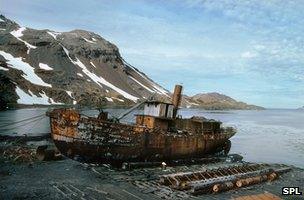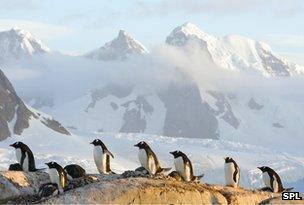Rat eradication project on South Georgia set to resume
- Published

Sealing and whaling ships brought the first rats, which have now multiplied massively
The largest animal eradication project the world has ever seen is set for its next phase.
The Habitat Restoration Project on the Atlantic island of South Georgia aims to wipe out millions of rats that first arrived on sealing and whaling ships.
A test mission to spread poison pellets in 2011, aiming to rid 128 sq km of the rodents, seems to have been successful.
The team is now targeting a further 580 sq km with poison pellets on a months-long mission to start in February 2013.
Brown rats may be a pest in the UK but in South Georgia they are pushing indigenous bird species to the brink of extinction.
They were first introduced to South Georgia by sealing boats in the late 18th Century and numbers were bolstered by rats arriving on whaling boats in the early 20th Century.
They quickly multiplied with no natural predators on the island.
For ground-nesting birds like the South Georgia pipit and South Georgia pintail, both of which are unique to the island, the rat explosion spells disaster because the rats feed on chicks and eggs.
Air drop
A trial phase in 2011 was the largest rodent eradication ever attempted and succeeded in removing rats from a tenth of the infested areas.
Prof Tony Martin, an expert in animal conservation from the University of Dundee, is the project's director. He said: "Almost immediately, there were young pintail ducks being seen around the base in numbers which no-one could remember - it was remarkably instant and we expect to see pipits returning very soon.

The island is home to millions of penguins, seals and seabirds
"But realistically most of the species which will benefit from the project will take years, maybe decades, to come back. But we're not in this for the short-term, this is something for the long-term."
The second phase of the project, detailed on Wednesday at a meeting in London, will see a 25-strong team of scientists, helicopter pilots, chefs and engineers embark on a four-month mission to eradicate the brown rat from the South Atlantic island.
They aim to clear 60% of the remaining area. The crew, dubbed Team Rat, will charter the RRS Ernest Shackleton from the British Antarctic Survey to transport them and their three helicopters, 270 tonnes of bait and shipping containers full of food and equipment.
"The only effective way to eradicate rodents on an island the size of South Georgia is by air," Prof Martin explained.
"The three helicopters will be used to deliver rat bait, using precisions flying, as they criss-cross the island with giant hoppers suspended underneath."
The hope is that eradicating the rats will mean 100 million pairs of seabirds return to the island once more.
Prof Tony Martin will be speaking to the Material World programme on Radio 4, which will air at 16:30 GMT on Thursday and will be re-broadcast at 21:00 on Monday 3 December, and available on iPlayer.
- Published5 May 2011
- Published6 March 2012